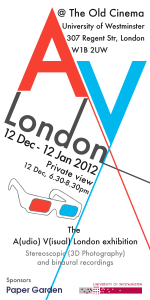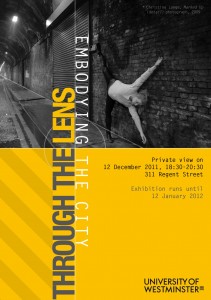News
‘Now! Visual Culture’ at NYU from May 31-June 2, 2012
Featuring:
*One Dozen Lightning Talks on the future of the field
*Workshops on multi-media software and film
*Open discussions on debt, academic publishing and interdisciplinarity
*Graduate student forum and a general assembly
*Practice, performance and diasporic art
Participants include: Safet Ahmeti, Giuliana Bruno, Wafaa Bilal, Jill Casid, Patsy Chang, Wendy Hui Kyong Chun, Beth Coleman, Jennifer Gonzalez, Raiford Guins, Gary Hall, Max Liljefors, Mark Little, Tara McPherson, Nicholas Mirzoeff, W.J.T. Mitchell, Lisa Nakamura, Paul Pfeiffer, Amanda du Preez, Martha Rosler, Joan Saab, Marquard Smith, Sina Najafi, Øyvind Vågnes, McKenzie Wark, Jason Wing, Joanna Zylinska, and many more
Full event details are at http://www.visualculturenow.org
As you may know, at the 2010 Visual Culture Studies Conference hosted by the Institute and held at University of Westminster in London, a decision was taken by those in attendance to constitute an International Association for Visual Culture. In 2011, at a follow-up meeting at the Clark Art Institute in Williamstown MA, a group delegated from that conference set the process of forming the Association in motion and decided to hold a participatory conference in New York in 2012. The goal of the 2012 conference is to showcase as broad and diverse a range of visual culture practice as possible, consistent with the goal of a low-registration, high-participation event.
There can only be a relatively limited number of delegates both for space reasons (only certain spaces can be used cost-free at NYU) and to create a strongly interactive conference experience. These sessions will take place at 20 Cooper Square, New York, 10003 in the Humanities Initiative space, a beautifully designed space overlooking the architectural drama of the Bowery.
On the website you will find a registration form: please consider registering!
Why does the event have a registration fee of $50 for faculty and $25 for students?
1) we have no supporting body so all costs have had to be covered
2) Much of the amount will be ‘given back’ in the coffee, lunch and receptions
3) Given the limited space, a small registration seemed appropriate as a means of committing
From Nicholas Mirzoeff, organizer of the 2012 International Association for Visual Culture conference
Cultures of Capitalism V: Money, Whitechapel Salon, April 5th
Tagged as art, money, politics, radical philosophy

Thursday 5 April 2012, 7pm
Whitechapel Gallery, 77-82 Whitechapel High Street, London E1
Price: £7.00 / £5.00 concessions (includes free glass of wine).
This season’s Whitechapel Salon organised by the IMCC in collaboration with the Whitechapel Gallery is on ‘Cultures of Capitalism’. The fifth salon turns to that social and economic form at the very heart of capitalist cultures: Money. In the light of contemporary crises in financial capitalism, Professor Peter Osborne, Director of the Centre for Modern European Philosophy at Kingston University, and author of books including The Politics of Time, Philosophy in Cultural Theory, and Conceptual Art, will be in discussion with David Cunningham about money, cultural form, and the nature of the ‘real’ today.
Book your ticket at:
http://www.whitechapelgallery.org/shop/index.php/fuseaction/shop.product/product_id/1160?
China in Britain #1: Film workshop, May 10th
Tagged as China, cinema, television

China in Britain #1. Film
Thursday May 10th 2012, 10.00 am – 6.00 pm
UPDATE: An important message from the organisers: because of our support for UCU Strike Action on May 10th, the venue has been transferred from the University of Westminster to The Brunei Gallery, School of Oriental and African Studies, Thornhaugh St., Russell Square, London WC1H OXG: http://www.soas.ac.uk/gallery/
You are invited to the first in a series of colloquia organised as part of China in Britain: Myths and Realities, an AHRC-funded research network project to investigate changing conceptions of China and Chineseness in Britain, and based at Westminster. The colloquia will connect up the important yet disparate work being done by cultural historians, literary critics, curators, archivists, contemporary artists, film makers and Sino-British organisations. In bringing these specialists together, the project aims to provide a high profile platform for the discursive elaboration of the changing terms of engagement between British and Chinese people and to widen the terms of debate from diaspora studies and simplistic reductions around identity to an inter-disciplinary network of research practice relevant to contemporary debate.
Participants include: Ross Forman (University of Warwick); Felicia Chan (University of Manchester) and Andy Willis (University of Salford); Jo Ho (filmmaker). The day will end with Guo Xiaolu introducing a screening of her film She, A Chinese, followed by a Q and A.
The Chinese presence in British cinema dates from James Williamson’s 1900 ‘documentary’ film, Attack on a China Mission, a recreation of that year’s ‘Boxer rebellion’ in which nationalist militants attempted to expel Christian missionaries and other foreigners from China. It was actually filmed in Brighton and Williamson had never visited China. A ‘yellow-face’ tradition followed, most popularly the Fu Manchu movies stretching through to the 1970s craze for kung fu – not until the early 1980s did Asian-British filmmakers finally make some inroads into the British film industry. In 1986 the first truly Chinese-British feature, Ping Pong (1986), reached the screen. Directed by the British-born director Po-Chi Leong, who had directed several features in Hong Kong, the film was set in London’s Chinatown, with a largely unknown cast – except for David Yip, best known as TV’s The Chinese Detective (BBC, 1981-82). Though critically lauded, however, the film failed to find the success it deserved, and neither it nor Mike Newell’s Soursweet (1988) adapted from Timothy Mo’s novel and scripted by Ian McEwan, has so far heralded the arrival of a healthy British-Chinese cinema. While China, Taiwan and Hong Kong-based directors like Zhang Yimou, Ang Lee and Wong Kar-Wai achieved arthouse and now mainstream success in Britain, other British-Chinese features such as BBC Film Peggy Su! (dir. Frances-Anne Solomon, 1998), failed to receive a proper release, despite favourable reviews. More recently Guo Xiaolu’s award winning film, She, A Chinese (2009), a British film in terms of its financing and much of its location, also failed to achieve due recognition from the film trade press and distributors. However a new generation of British-born or British-based Chinese are at the vanguard of positive change, amongst them University of Westminster alumna, Jo Ho, who created the hit BBC television show, Spirit Warriors (the first British series to star a predominantly East Asian cast) and who is now working on several feature films, and award winning director, Belfast born Lab Ky Mo.
RSVP – Places are free but strictly limited so it is essential to register with the project’s Principal Investigator, Anne Witchard, at: anne@translatingchina.info
WEBSITE: http://www.translatingchina.info
Socialism, Literature and the Radiant Future seminar
Tagged as Literature, Modernism, politics, the avant-garde, The Future

Wednesday 7th March, 1.15pm – 2.30pm
Room 257, University of Westminster, 309 Regent Street
Matthew Taunton (Queen Mary, University of London)
‘Socialism, Literature and the Radiant Future: Before and After 1917’
Abstract: The idea that a “radiant future” (in Zinoviev’s phrase) was just around the corner was central to the Soviet myth. But how were Western ideas about the future affected by the advent of the Bolshevik revolution? This paper will suggest that the bright eyed visions of the future prevalent in the fin de siècle and the Edwardian period were increasingly replaced, after 1917, by sectarian debates about Russia. The future had become a spatial, rather than a purely temporal entity – whether it was to be welcomed as the true democracy (Shaw, the Webbs) or feared as a totalitarian nightmare (Orwell, Koestler, Nabokov). Speculative fictions like those of Morris, Bellamy, and Wells gave way to anti-Communist texts like Darkness at Noon, Nineteen Eighty-Four and Bend Sinister, and endorsements of Stalinism by Day Lewis, Shaw and others. This paper explores a range of ways in which ‘the future’ had to be rethought in light of the events of 1917.
PLEASE NOTE: We have changed seminar rooms this week and will be in Regent Street room 257.
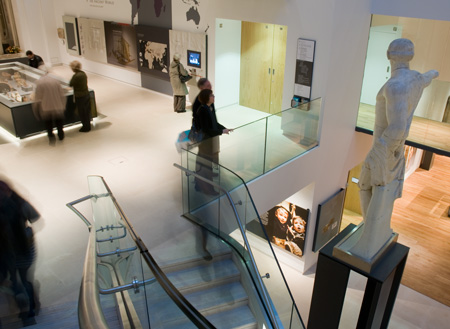
The IMCC-affiliated MA in Museums, Galleries and Contemporary Culture at Westminster, in association with The Johns Hopkins Masters Program in Museum Studies, presents:
Teaching with Collections: A Discussion Forum
Tuesday 20 March 2012, 6.30 – 8.30
Fyvie Hall, University of Westminster, 309 Regent Street, London W1B 2UW
Keynote Speaker: Henry Kim, Ashmolean Museum, Oxford
Henry Kim is the Director of the University Engagement Programme, a three-year project sponsored by the Andrew W. Mellon Foundation, aimed at expanding the use of the museum’s collections in teaching across the University, as well as a specialist on archaic and classical Greek coins and European medals. He has been a curator at the Ashmolean Museum and university lecturer in Greek numismatics at the University of Oxford since 1994, and was the Project Director for the Ashmolean Redevelopment Project, completed in November 2009 and the redevelopment of the Egypt Galleries, completed in November 2011.
Open and free to all. No booking required, but RSVP appreciated. Further information and RSVP: Helena Scott, scotth@westminster.ac.uk
Wyndham Lewis and Cinema talk, Feb 22nd
Tagged as cinema, Literature, Modernism, Theory

Wednesday 22nd February, 1.15pm – 2.30pm
Room 359, University of Westminster, 309 Regent Street
Anthony Paraskeva (University of Dundee)
‘Wyndham Lewis, Cinema Hypnotism and the Frankfurt School’
Cory Doctorow at University of Westminster, 22nd Feb at 3
Tagged as novel, science fiction, technology, war
Wednesday 22 February at 3pm
2.05A School of Law, 4 Little Titchfield Street, London W1W 7UW
Cory Doctorow
‘There is a war coming: the future regulation of general purpose computation’
Organised by our friends in The Centre for Law, Society and Popular Culture
ALL WELCOME. RSVP Danilo Mandic: danilo.mandic@my.westminster.ac.uk
Cory Doctorow (craphound.com) is a science fiction author, activist, journalist and blogger — the co-editor of Boing Boing (boingboing.net) and the author of Tor Teens/HarperCollins UK novels like FOR THE WIN and the bestselling LITTLE BROTHER. He is the former European director of the Electronic Frontier Foundation and co-founded the UK Open Rights Group. He is the author of Content: Selected Essays on Technology, Creativity, Copyright and the Future of the Future, (2008). Born in Toronto, Canada, he now lives in London. See further, http://craphound.com/bio.php
WESTMINSTER.AC.UK/LAW
Cultures of Capitalism: Education at the Whitechapel Salon, Feb 16th
Tagged as education, politics, radical philosophy
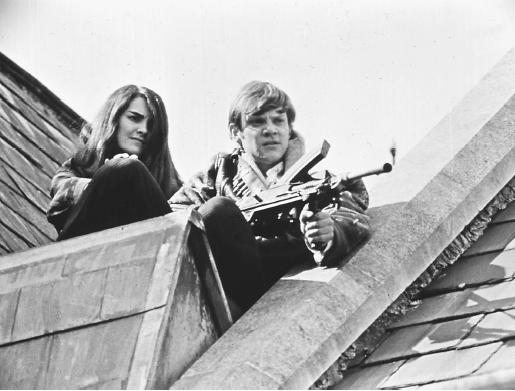
Thursday 16 February 2012, 7pm
Whitechapel Gallery, 77-82 Whitechapel High Street, London E1
Price: £7.00 / £5.00 concessions (includes free glass of wine).
This season’s Whitechapel Salon organised by the IMCC in collaboration with the Whitechapel Gallery is on ‘Cultures of Capitalism’. Our fourth discussion focuses on future of education under contemporary capitalism, with guest participants Mark Fisher, author of Capitalist Realism, Andrew McGettigan, author of the arts and humanities blog Critical Education, and Andrea Phillips, Reader in Fine Art Practice and Director of Research Studies, Goldsmiths. Chaired by Marquard Smith.
Book your ticket at: http://www.whitechapelgallery.org/shop/product/category_id/22/product_id/1120?session_id=1325609439457568b84811bd9f97bb2cb619476b46
UPDATE: Unfortunately Mark Fisher is unable to participate on this occasion because of illness. Hopefully we’ll be able to get him down again for a future event in the Salon series.

TheBeautifulGame_E-Invite_RSVPTOWESTMINSTER
Thursday 1st March 2012
Reception: 6-7; Screening: 7-9
The Old Cinema, University of Westminster, 309 Regent Street
RSVP to: Katrina Fender (k.fender@westminster.ac.uk)
Our friends in The Centre for Law, Society and Popular Culture at the School of Law, University of Westminster in association with Africa10 are delighted to invite you to a special preview screening of The Beautiful Game, a new documentary from director Victor Buhler. The film celebrates the work of The Right to Dream Academy, and is generously supported by Alisa Swidler and Leke Adebayo.
‘Now! Visual Culture’ at NYU, May 31-June 2, 2012, the second biennial conference of the International Association for Visual Culture
Tagged as art, visual culture

http://www.visualculturenow.org/itinerary/
“Now! Visual Culture” is a participation event, to be held at New York University, May 31-June 2 2012. The goal is to showcase as broad and diverse a range of visual culture practice as possible in order to create a snapshot of the field of visual culture as it is currently practiced from Cape Town to California.
At the 2010 Visual Culture Studies Conference in London, hosted by the Institute at University of Westminster, a decision was taken to constitute an International Association for Visual Culture. A key principle was that the Association should ask as little as possible financially from its members while involving as many people as possible in decision making. This is the first event organized under this platform. By the end of the event, delegates will have both experienced and created the transformation of the field from an interaction of cinema studies and art history (as it was in the 1990s) to the present intersection of Web 2.0, iconology, contemporary art practice, and critical visuality studies.
The event is structured so that all delegates will attend a single stream of sessions to create a strongly interactive conference experience. The event begins with 15×5 minute lightning talks on the state of the field by people ranging from postdocs to professor emeritus. There are eight sessions following, organized by people in a variety of locations, including the Visual and Cultural Studies Program at the University of Rochester, the Brooklyn Filmmakers Collective, the Alliance for Networking Visual Culture and the Diasporic Asian Art Research group. Each session will be independently organized in keeping with the horizontal ethics of the Association.
Particular time slots have a hands-on workshop, film screenings, panel discussions or a combination of the above.
Current session themes include:
a workshop with Scalar, a born-digital multi-media authoring platform
the role of design in globalization
new media coverage of the Occupy Wall Street movement
Asian diaspora art practices
practice in and as visual culture
a graduate student forum
the general assembly of the International Association for Visual Culture
keynote ‘listeners’ and talkback
Lots of time for networking and enjoying New York, with receptions every night, a gallery exhibition of online and material work, and maybe a late-night shenanigan or two!
‘Exhibiting Video’ conference, 23-25 March – Call for Papers extension
Tagged as art, cinema, visual culture

http://www.westminster.ac.uk/research/a-z/cream/events/exhibiting-video-conference
CALL FOR PAPERS – EXTENDED CALL
DEADLINE 15 February 2012
Exhibiting Video – International Conference
Date: 23 – 25 March, 2012
University of Westminster, 309 Regent Street, London, W1B 2UW
In March and April 2012 Ambika P3, the flagship exhibition space at the University of Westminster, will present a major solo exhibition of the influential pioneer of video art, David Hall in association with REWIND. To mark the occasion the Centre for Research and Education in Arts and Media (CREAM) of the University of Westminster is convening Exhibiting Video, a three-day event considering issues central to the display of video art.
We welcome proposals for papers of a maximum of 30 minutes. Send abstracts of no more than 250 words. They must include the presenter’s name, affiliation, email and postal address, together with the title of the paper and a 150-word biographical note on the presenter. Abstracts should be sent to Helen Cohen at photography@westminster.ac.uk and arrive no later than Wednesday 15 February 2012.
Wednesday 1 February 2012, 6 pm – 8 pm,
Room 152, University of Westminster, 309 Regent Street, London W1B 2UW
True Lies of War
Group for War and Culture Studies Seminar
Hongping Annie Nie, University of Oxford
“China’s War with Japan (1937-1945): A Study of Chinese History Textbooks”
Dr. Hongping Annie Nie (MA in Education, Calvin College, USA; Ph. D. in Cross-cultural Education, Biola University, USA) is currently Faculty Tutor of Chinese Politics at the Faculty of Oriental Studies, University of Oxford. She is also a core member of the Leverhulme funded China’s War with Japan Project, History Faculty, University of Oxford. Her research interests include moral/ideological education, mass communication, patriotism, and national memory. Among her publications are The Dilemma of Moral Education Curriculum in a Chinese Secondary School (University Press of America, 2007) and “On-line Gaming, Ideological Work, and Nationalism in China” (Journal of Contemporary China, forthcoming).
Celine Righi, London School of Economics
“Memory in post-Civil War Lebanon under artistic scrutiny: a space for individual and social autonomy in the public debate?”
Celine Righi completed a Master in Political Sciences at Science Po Lyon in 2000 and a Master in Social Psychology at Paris IX Dauphine University in 2001. After working for a think tank in Paris and Lyon in the field of social and economic development, Celine embarked in her PhD in 2008 at the Institute of Social Psychology at London School of Economics.
Entrance free. To reserve a place, please R.S.V.P. Dr Caroline Perret: C.Perret@westminster.ac.uk
The London Reading Club
Tagged as Literature, London, novel, Urban

A quick plug for the London Reading Club, a new blog for the book group attached to the MA Writing the City at the University of Westminster, which is run by our own Monica Germana. Check out posts that discuss London writings ranging from Virginia Woolf to Monica Ali here: http://thelondonreadingclub.wordpress.com/
IMCC hosts London premier of An Ecology of Mind, Feb 27th
Tagged as Architecture, Bateson, ecology, technology

An Ecology of Mind: A Film by Nora Bateson
Monday 27 February 2012, 18:30-22:00 pm
Old Cinema, University of Westminster, 309 Regent Street, London W1B 2UW
Tickets: £9.50; £3.50 (student/unwaged/Westminster staff)
Book your ticket from: http://anecologyofmindlondon.eventbrite.co.uk/
The Institute for Modern and Contemporary Culture (IMCC) at the University of Westminster is proud to host the London premier of Nora Bateson’s An Ecology of Mind: A Daughter’s Portrait of Gregory Bateson. The screening will be followed by an interdisciplinary panel and audience discussion with Nora Bateson, and will end with a wine reception in the Regent Street foyer.
Panel with Nora Bateson; Iain Boal (Birkbeck College); Jody Boehnert (Brighton University); Ranulph Glanville (American Society for Cybernetics); Peter Reason (Action Research); and Wendy Wheeler (London Metropolitan University). Chaired by Jon Goodbun (IMCC and Architecture, Westminster)
“Tell me a story” … of life, art and science, of systems and survival. Gregory Bateson’s way of thinking – seeing the world as relationships, connections and patterns – continues to influence and provoke new thinking about human social life, about ecology, technology, art, design and health. Nora Bateson, Gregory’s youngest daughter, introduces Bateson’s ideas to new audiences in her film An Ecology of Mind, using the metaphor of a relationship between father and daughter, and footage of Bateson’s talks.
Each screening, too, hosts a discussion between Nora and a wide range of people working in depth with Bateson’s ideas: artists, architects, action researchers, ecological activists, mental health practitioners, scientists, urban designers, cyberneticians. These screenings and discussions intend to show a way of thinking that crosses fields of knowledge and experience, one that can lead out of the ecological crisis and towards a more sound way of living.
Awards for the film:
Gold for Best Documentary, Spokane International Film Festival, 2011
Audience Award Winner, Best Documentary, Santa Cruz Film Festival, 2011
Winner, Media Ecology Association, John Culkin Award for Outstanding Praxis, 2011
Event organised by Jon Goodbun (Westminster), Wallace Heim, Kevin Power (Centre for Action Research, Ashridge Business School) and Eva Bakkeslett
To book a ticket go to: http://anecologyofmindlondon.eventbrite.co.uk/
Call for papers: Ecologies of the Visual
The Third Visual Culture in Europe Meeting, Trondheim, 6-7 September 2012
Contributions are invited which address the relationship between ecology and visuality in the broadest sense. On the one hand several discourses have come to revolve around what Susan Sontag described in On Photography as an ecology of images, a perspective which raises both epistemological and ethical questions concerning our interactions with the image. On the other hand there are presently several indications of a pressing need for the field of visual culture studies to address what we might call the visualities of ecology, or the place of environmental issues in contemporary visual culture. Topics may include but are by no means limited to:
Images and Ethics // “Ecology” as a Metaphorical Nexus in Visual Studies // Visual Culture within and without the Ecology of Disciplines // Consumerism and Visual Culture/The Visual Culture of Consumerism // Climate Change in/and Visual Culture // The Rhetorics of Environmentalism in Media and/or Art // Apocalyptic Narratives in Visual Culture
To submit a proposal for a paper presentation, please email an abstract of approximately 200 words to the conference organisers, Nina Lager Vestberg (nina.vestberg@ntnu.no) and Øyvind Vågnes (ov@nomadikon.net), by 7 March 2012.
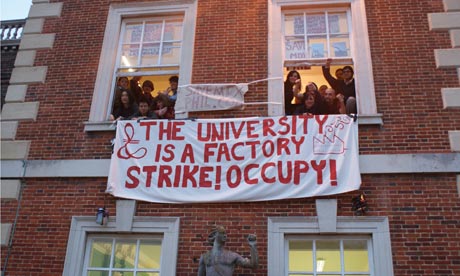
Thursday 16 February 2012, 7pm
Whitechapel Gallery, 77-82 Whitechapel High Street, London E1
Price: £7.00 / £5.00 concessions (includes free glass of wine).
This season’s Whitechapel Salon organised by the IMCC in collaboration with the Whitechapel Gallery is on ‘Cultures of Capitalism’. Our fourth discussion focuses on future of education under contemporary capitalism, with guest participants Mark Fisher, author of Capitalist Realism, Andrew McGettigan, author of the arts and humanities blog Critical Education, and Andrea Phillips, Reader in Fine Art Practice and Director of Research Studies, Goldsmiths. Chaired by Marquard Smith.
Book your ticket at: http://www.whitechapelgallery.org/shop/product/category_id/22/product_id/1120?session_id=1325609439457568b84811bd9f97bb2cb619476b46
Literature Research Seminars, Feb-March 2012
Tagged as Literature, Modernism

A heads up on the line up of speakers and list of dates for this semester’s series of English Literature and Culture seminars. All will take place from 1.15-2.30pm on Wednesday lunchtimes in the University’s Regent Street building (room 359).
8th February 2012
Morgan Daniels (Queen Mary, London)
‘Satire and Childishness’
22nd February 2012
Anthony Paraskeva (University of Dundee)
”Wyndham Lewis, Cinema Hypnotism and the Frankfurt School’
7th March 2012
Matthew Taunton (Queen Mary, London)
‘Socialism, Literature and the Radiant Future: Before and After 1917’
21st March 2012
Aisling McKeown (Westminster)
‘Once Upon a Time in the West: Rural Idyll in Contemporary Irish Fiction and Film’
Further details at: http://seminarserieswmin.wordpress.com/2012/01/11/semester-two-seminars-unveiled/

Agit Disco
Conceived & compiled by Stefan Szczelkun,
edited by Anthony Iles
We’re very pleased to announce the forthcoming publication of Stefan Szczelkun’s new book Agit Disco, which collects the playlists of its 23 writers to tell the story of how music has politically influenced and inspired them. The book provides a multi-genre survey of political musics, from a wide range of viewpoints, that goes beyond protest songs into the darker hinterlands of musical meaning. Each playlist is annotated and illustrated. The collection grew organically with an exchange of homemade CDs and images. These images, with their DIY graphics, are used to give the playlists a visual materiality.
Almost everyone makes selections of music to play to themselves and friends. Agit Disco intends to show the importance of this creative activity and its place in our formation as political beings. This activity is at odds with to the usual process of selection by the mainstream media – in which the most potent musical agents of change are, whenever possible, erased from the public airwaves.
Agit Disco Selectors: Sian Addicott, Louise Carolin, Peter Conlin, Mel Croucher, Martin Dixon, John Eden, Sarah Falloon, Simon Ford, Peter Haining, Stewart Home, Tom Jennings, DJ Krautpleaser, Roger McKinley, Micheline Mason, Tracey Moberly, Luca Paci, Room 13 – Lochyside Scotland, Howard Slater, Johnny Spencer, Stefan Szczelkun, Andy T, Neil Transpontine, Tom Vague
Publication Date: January 2012. RRP: £11.99. ISBN: 978-1-906496-51-7
Mute books, 46 lexington st, london, w1f 0lp. www.metamute.org
Contact: Caroline Heron, caroline@metamute.org, 020 3297 9005
You are invited to the Private View of two exhibitions (including drinks reception):
AND
Monday 12th December 2011, 18:30 onwards
309 Regent Street Gallery, University of Westminster, London W1B 2UW
‘AV London’ and ‘Through the Lens: Embodying the City’ are curated by students on MA Cultural and Critical Studies, MA Museums, Galleries & Contemporary Culture, and MA Visual Culture, University of Westminster
Back in July, IMCC Visiting Fellow Dr Young-Paik Chun from Hongik University in Seoul programmed an event on Korean contemporary art on British soil at London’s Korean Cultural Centre. Details here.
Following the event, a report entitled ‘Situating Korean Fine Art Practice in a Western Context’ written by Dr John Cussans came to our attention. It is attached here, many thanks to John for making it available, and our apologies for the delay in posting it:


The Institute for Modern and Contemporary Culture
University of Westminster Department of English, Linguistics and Cultural Studies
32-38 Wells Street, London W1T 3UW. United Kingdom.

